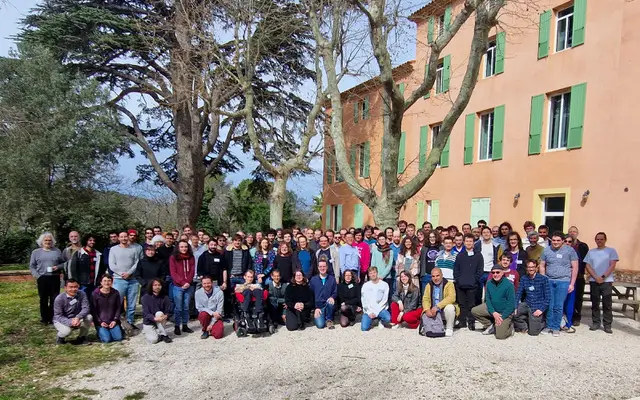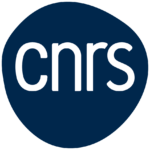MULTIYEAR PROGRAM
RESEARCH SCHOOL - ÉCOLE DE RECHERCHE
Scientific Committee
Comité scientifique
Mathilde Bouvel (CNRS, Université de Lorraine)
Luc Devroy (Mc Gill University)
Éric Fusy (CNRS, Université Gustave Eiffel)
Conrado Martinez (Polytechnic University of Catalonia)
Organizing Committee
Comité d’organisation
Wenjie Fang (Université Gustave Eiffel)
Vincent Jugé (CNRS, Université Gustave Eiffel)
Marc Noy (Universitat Politècnica de Catalunya)
Carine Pivoteau (Université Gustave Eiffel)
The annual meeting Aléa is dedicated to the study of random discrete structures arising in various scientific domains, mainly in theoretical computer science, combinatorics and probability theory, but also in statistical physics, bioinformatics or in other branches of mathematics.
These structures are, for example, trees, words, permutations, lattice walks, more geometrical objects like planar maps, or other objects related to discrete dynamics like cellular automata. Aims and methods are diverse, ranging from enumeration, asymptotic properties and analytic combinatorics, probability, random generation…
The Aléa meeting is closely related to the community of the Working Group Aléa of the “Groupement de recherche CNRS” gdr-im, which was created in the 90’s under the impulse of Philippe Flajolet to promote interactions between combinatorics and probability around the analysis of algorithms. In the last ten years it has been the birth place to many fruitful interdisciplinary collaborations (e.g. on planar maps, walks in quarter plane, algebraic urns…) and it has grown into one of the most active interface between computer scientists and mathematicians in France. The program of the conference aims both at broadening the common knowledge of the participants via mini-courses and invited long talks, and at reflecting the variety and dynamism of the community via short talks that are selected through an open call.
Les journées Aléa sont consacrées à l’étude de l’aléa discret, i.e. l’étude des structures aléatoires discrètes telles qu’elles apparaissent dans diverses disciplines, principalement l’informatique théorique, la combinatoire et la théorie des probabilités, mais aussi la physique statistique, la bio-informatique ou d’autres branches des mathématiques.
Les objets d’études sont par exemple les arbres, les mots, les permutations, les chemins, ou des objets plus géométriques comme les cartes, ou encore liés à une dynamique discrète comme les automates cellulaires. Les objectifs et les méthodes utilisées sont divers : l’énumération, les propriétés asymptotiques et la combinatoire analytique, les propriétés probabilistes, la génération aléatoire…
Les journées Aléa sont étroitement liées à la communauté du groupe de travail Aléa du gdr-im, créé à l’initiative de Philippe Flajolet vers la fin des années 90 pour favoriser les interactions entre combinatoristes et probabilistes autour de l’analyse d’algorithmes. Au cours de ces dix dernières années, elles ont été le creuset de nombreuses et fécondes collaborations interdisciplinaires (e.g. autour des cartes planaires, des marches dans le quart-de plan, des urnes algébriques…) et elles sont devenues lieu d’expression de l’une des interfaces math/info les plus actives en France. Le programme répond au double objectif d’assurer une forme de formation continue de la communauté au travers de cours invités et d’exposés longs, et de refléter sa diversité et son dynamisme au travers d’exposés courts sélectionnés via appel à propositions.
MINI-COURSES
Durée: for a total 2.5 hours + exercise session of 1 hour, each
We showcase several algorithmic methods that can assist in solving combinatorial problems. Such algorithms include recurrence guessing, closure properties for D-finite functions, creative telescoping, or cylindrical algebraic decomposition, which are implemented in many today’s computer algebra systems. We demonstrate with numerous examples how these can be applied beneficially in the context of enumerative combinatorics.
La théorie des automates cellulaires et celle de la percolation s’enrichissent mutuellement depuis un certain temps. La théorie de la percolation étudie les propriétés de connectivité de sous-graphes aléatoires d’un réseau régulier, et fournit des outils pour étudier l’évolution de certains automates cellulaires à partir de configurations aléatoires, ou le comportement d’automates cellulaires probabilistes. Inversement, la théorie des automates cellulaires permet de mieux comprendre certaines propriétés de percolation et soulève de nombreuses questions. Dans ce cours, je présenterai quelques liens bien connus entre automates cellulaires et percolation, en terminant par un développement plus récent : l’étude d’un jeu combinatoire sur des configurations de percolation.
LONG TALKS
Je présenterai une manière de construire des arbres aléatoires basée sur les minorants convexes de fonctions (aléatoires). Dans le cas Brownien, cette procédure est reliée au coalescent additif et à l’arbre continu Brownien, c’est-à-dire la limite d’échelle d’arbres uniformes, et de la fragmentation naturelle qui consiste à retirer les arêtes dans un ordre aléatoire. En modifiant un peu la fonction de départ, on obtient un arbre lié au coalescent multiplicatif (graphes aléatoires) et à l’arbre couvrant minimum d’un graphe complet pondéré aléatoirement. Cette construction conduit aussi à la définition naturelle de nouveaux processus de coalescence/fragmentation liés à des graphes aléatoires contraints et/ou à la percolation d’invasion avec sources multiples. L’exposé sera basé sur des travaux en commun avec J.-F. Marckert d’une part et Arthur Rousseau d’autre part.
Certains logiciels de gestion de versions comme Git et Mercurial organisent l’historique d’un projet sous la forme d’un graphe orienté acyclique, les sommets représentant les différentes versions du projet et les arêtes indiquant les changements intervenus entre elles.
À l’origine, avec Paul Dorbec et Romain Lecoq (Univ. Caen Normandie), on a analysé la complexité dans le pire des cas d’un algorithme de graphes issu de Git, qui s’appelle git bisect. Cet algorithme sert à débusquer l’introduction d’un bug dans un graphe. Nous avons montré que git bisect avait une stratégie totalement catastrophique pour certains graphes particuliers. Mais qu’en est-il en moyenne ?
Derrière cette épineuse question, il faut d’abord s’interroger sur la forme typique d’un graphe représentant l’historique d’un projet dans un logiciel de gestion de versions. En théorie n’importe quel graphe acyclique peut être obtenu, mais dans la pratique, la forme de ces graphes est contrainte par des conventions de « bonne pratique ».
Je vais donc introduire une famille de graphes à la fois simples et réalistes, qu’on a appelés « graphes de Git ». Je vais alors vous présenter le problème de comptage de ces graphes, ainsi que des générateurs aléatoires. Il s’agit ici d’une collaboration avec Martin Pépin à Univ. Caen Normandie).
On assigne à chaque sommet v d’un graphe G une étiquette aléatoire l(v) de k bits, et on veut qu’il existe un décodeur déterministe D(.,.) tel que pour toute paire de sommets u,v de G, D(l(u),l(v)) dit si oui ou non u et v sont adjacents dans G, de manière correcte avec probabilité au moins 2/3.
On souhaite que D dépende uniquement de la classe de graphe qu’on considère (et pas de chaque graphe G dans la classe) et le problème le plus basique est de comprendre les classes de graphes pour lesquelles on peut choisir des étiquettes de taille k constante. C’est équivalent au fait de comprendre les (familles de) problèmes dont la complexité de communication aléatoire est constante. J’expliquerai ce lien et les différences fondamentales avec la version complètement déterministe du problème, je donnerai quelques résultats positifs et finalement mentionnerai un certain nombre de questions ouvertes.
Travail en commun avec Nathan Harms et Andrey Kupavskii.
Dans cet exposé, je parlerai de deux travaux récents: le premier sur l’utilisation des grands modèles de langage pour la formalisation des mathématiques et le second sur l’utilisation d’architectures de réseaux de neurones graphiques pour apprendre des problèmes d’optimisation combinatoire.
Many classical sequences of integers have well established q-analogs. The most fundamental ones are certainly the q-integers and the q-binomial coefficients which both appear in various areas of mathematics and physics. With Valentin Ovsienko we recently suggested a notion of q-rational numbers based on combinatorial properties and on continued fraction expansions. The definition of q-rationals naturally extends the one of q-integers and leads to a ratio of polynomials with positive integer coefficients. Several enumerative interpretations of the coefficients can be given. The construction of q-rationals naturally leads to definitions of q-irrationals and q-unimodular matrices. Developments in various directions have been suggested. In particular there are connections with the combinatorics of posets, cluster algebras, homological algebra, braid groups and knots invariants. In this talk I will give an overview of the subject, starting with the basic definitions and properties of the q-rationals and ending with recent results on the Burau representation of the braid group.
SHORT TALKS
Rafik Aguech (King Saud University) On a class of step-reinforced random walks
Jérémie Bettinelli (CNRS, École polytechnique) Slit-slide-sew bijections for oriented planar maps
Arthur Blanc-Renaudie (CNRS Université de Rouen Normandie) Percolation légèrement sur-critique en grandes dimensions
Pierre Bonnet (Université de Bordeaux) Classification des marches à bords interactifs dans le quadrant : le genre 0
Jérôme Casse (Université Paris-Saclay) D4-quasi-reversibilité de modèles balistiques
Guillaume Chevalier Université de Bordeaux) Probabilité de passage de marches aléatoires dans des arbres infini
Colin Desmarais (TU Wien) Depths in random recursive metric spaces
Valentin Feray (CNRS, Université de Lorraine) Chaînes montantes-descendantes et limites d’échelle
Jules Flin (Télécom SudParis) Méthode des invariants de Tutte et particules browniennes en interaction
Wissem Jedidi (Université Tunis el Manar & King Saud University) New results on generalized Stieltjes transforms, with application to infinite divisibility
Emmanuel Kammerer (École polytechnique) Arbres récursifs gelés et application à l’étude de l’arbre des infections
Dimitri Korkotashvili (École polytechnique) Slit-slide-sew bijections for constellations and quasiconstellations
Marc Lelarge (Inria – ENS) Maths et IA
Victor Lutfalla (Aix-Marseille Université) Bootstrap percolation on rhombus tilings
Maxime Marivain (École polytechnique) Brochette first passage percolation
Thomas Muller (Université de Bordeaux) Higher dimensional Floorplan and Baxter d-permutations
Khaydar Nurligareev (Sorbonne Université) Brick wall excursions
Frédéric Paccaut (Université Picardie Amiens) Shannon weights for sources with zero entropy rate
Élie de Panafieu (Nokia Bell Labs France) Probabilité que voter utile soit superflu
Bernhard Reinke (Aix-Marseille Université) Emergence of random tree automorphisms
Juliette Schabanel (Université de Bordeaux) 3-permutations et bases du triangle
Benjamin Testart (Université de Lorraine) Enumération des séquences d’inversions qui évitent des motifs
Paul Thévenin (Université d’Angers) Sommes de Catalan et systèmes méandriques
Nicolas Tokka (Université Paris-Nanterre) Ising model with external magnetic field on random planar maps: critical exponents
Zoé Varin (Université de Bordeaux) Modèles stochastiques continus de dispersion sur le cercle
Ivan Yakovlev (MPIM Bonn) Fonctions de comptage polynomiales pour les graphes en rubans métriques










